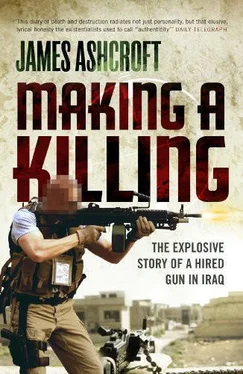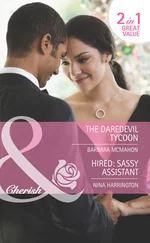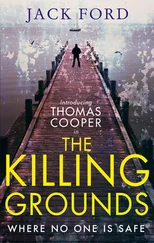Now if a man wanted to survive and feed his family he had to beg for a living working for the only people with money◦– the hated Crusader occupiers who watched without helping after they had turned their neighbourhoods into blacked-out, sewage-ridden playgrounds for gangs of murderers, kidnappers and rapists. The vast majority of the Iraqi people hated the Americans with a passion that would never be understood by those who had come to liberate them from Saddam.
The end result was that Iraqis put in charge of the handover refused to deal with Americans and TF Fountain commander Colonel Hind couldn’t get a meeting with officials at the Ministry of Water. Decisions costing tens of millions of dollars◦– which should have been made jointly by the CPA and the Ministry◦– involving water purification, pipe-laying and security, were negotiated over hot sweet tea in tiny glasses by Seamus Hayes and me, two guys off the street with no authority whatsoever.
The property Sammy and Ibrahim had found was an abandoned bus depot with a block of offices and an administration building. There was a gate at the entrance and enough space for several vehicles. Shakir Ahmad, the owner, was about my age, mid-thirties, with short-cropped hair circling a bald spot and a moustache. He had the typical Iraqi build, portly and pear-shaped, with heavy lips that swelled into the deep satisfaction of someone who would now have a dollar income every month of the year. The fact that we would be looking to hire guards from the local area was another boost to the local economy and had brought the village elders on side.
Aradisa Idah was a crisscross of streets like many streets in Baghdad, with two-storey buildings with flat roofs. The windows were always shuttered, the exteriors giving no clue to the lives going on within. Sometimes you would hear Arabic music or televisions, but mostly the houses would be eerily silent. Many of the buildings contained shops on the ground floor. There were market stalls along the pavement selling lengths of rope, flattened oil drums, old books and odd bits of unidentifiable produce grown on the surrounding smallholdings. Beyond the cluster of streets were fields with a few buildings, shacks for the most part with palm-frond or corrugated-iron roofs.
The faces of the candidates running in the upcoming elections stared from posters plastered on the mud-coloured walls, each seat being contested by scores of new parties. The ballot paper was like a telephone directory. People would only vote for those they were related to or who were members of the same tribe. By the next full elections there would be over seven thousand candidates. It was a kind of democracy.
This was an area of hard-working people, policemen, small businessmen, government workers. They didn’t feel under threat from insurgents, but from the criminal gangs that had mushroomed since the fall of Saddam. We set out to make friends with the local people. We reminded them that we would be employing at least one male member from every family in the area as well as supplying purified water. We discreetly gave them bribes, and in return they indiscreetly reported when there were bombs and bad guys in town. The streets looked safe enough but it wasn’t wise for Westerners to walk around. The word would go out and some bad news would come looking for us.
From a military standpoint, we had to look at the property in terms of how we could extricate ourselves from it if the need arose. Was it defendable? How many potential firing points on to it were there? Were there any obvious landmarks on the skyline at night which would allow rebels to mortar us? Was there satisfactory ingress and egress for our vehicles? More importantly, was there easy ingress for a suicide bomber to ram the gates with a car bomb?
The answer was that ‘the villa’ would do very nicely.
The property comprised two single-storey, bare concrete buildings in a compound behind eight-foot walls. The main building was twenty feet from our next-door neighbour, a residential house where a family lived. All the other properties in the immediate vicinity were also occupied, which we considered an advantage. Like us, our neighbours wanted to avoid mortars, bombers and badness. The road network around the complex was far from perfect, but the addition of a few strategically placed barriers would be the ideal compromise between allowing us easy exit routes but denying easy entry to any potential car bomb, or vehicle-borne IEDs (VBIEDs).
The two buildings were in a state of total disrepair and the owner nodded contentedly as we outlined what changes we intended to make. We planned to rewire the complex, put in plumbing and bathrooms, paint the walls, put in windows, furniture, phone points, computer jacks and a satellite dish. This was going to be our home and it would all belong to Shakir Ahmad when we left.
‘ Shukran jazeeran , Mister. Thank you very much.’
Ahmad touched his palms to his chest and the village elders watched as eight burly white men chased through the derelict building, each one of us intent on grabbing the best room for ourselves. There were four rooms that we’d convert into bedrooms and I ended up with Dai, a smoker.
We told Sammy we wanted to get moving straight away and a gang of workmen were waiting to start first thing the following day. They wanted to get in, get the job done and get out with their dollars. Carpenters wielding biblical tools started putting in windows, electricians ran a cable from the mains up walls and across ceilings. I don’t think we ever got an electricity bill. Fucking cowboys , Les kept saying, but the house was being transformed a damn sight quicker than you’d ever get it done in London.
The rooms were cleaned and painted, sometimes just painted. We built an extension on the front of the main house and the plumber installed a shower block; he was the same guy who had cut six inches off some of the AKs, the pipe and tube man.
We sent Sammy off to buy some furniture. Bought from a warehouse, it was cheap and nasty, very cheap, in fact: each room was furnished for about $40, a price that included everyone putting their cut on top.
The warehouse owner probably didn’t sell cookers, fridges, microwaves, cutlery, crockery, saucepans and all the little comforts you expect in a modern kitchen, but someone from the tribe probably did and all these things were found and ferried out to the villa in the coming days. It’s surprising what you can achieve in the developing world with a few hundred thousand dollars in your pocket.
We had saved so much money from our original budget that Les, Seamus, Dai and I sat down to think of what else we needed.
‘How about a projector and a surround-sound system?’ suggested Les. ‘We could watch TV on that big wall. Don’t forget, the Olympics are coming.’
‘Mate, I don’t fall out with that idea,’ replied Seamus enthusiastically.
‘Hey, what about us, don’t we have a vote?’ piped up Cobus from the doorway.
‘Fuck me, here we go.’ Dai pulled his fag out of his mouth. ‘As if you Seth Efrrikaan cunts know about electricity and televisions.’ He pointed out the window where the rest of the South Africans were standing around their braii , barbecuing dinner. ‘When you lot have finished inventing fire, I’ll teach you how to use flushing toilets.’
‘Yer Fokken Welsh rabbit,’ Cobus said and slapped the Glock in the holster on his thigh.
We took the piss out of the Yaapies and they took $50 off each of us every time there was a shooting competition.
Seamus immediately tasked Ibrahim to go and find us the projector and surround-sound system. He had no idea what we were talking about but once the concept was described to him he was delighted and zoomed off into town.
Читать дальше












